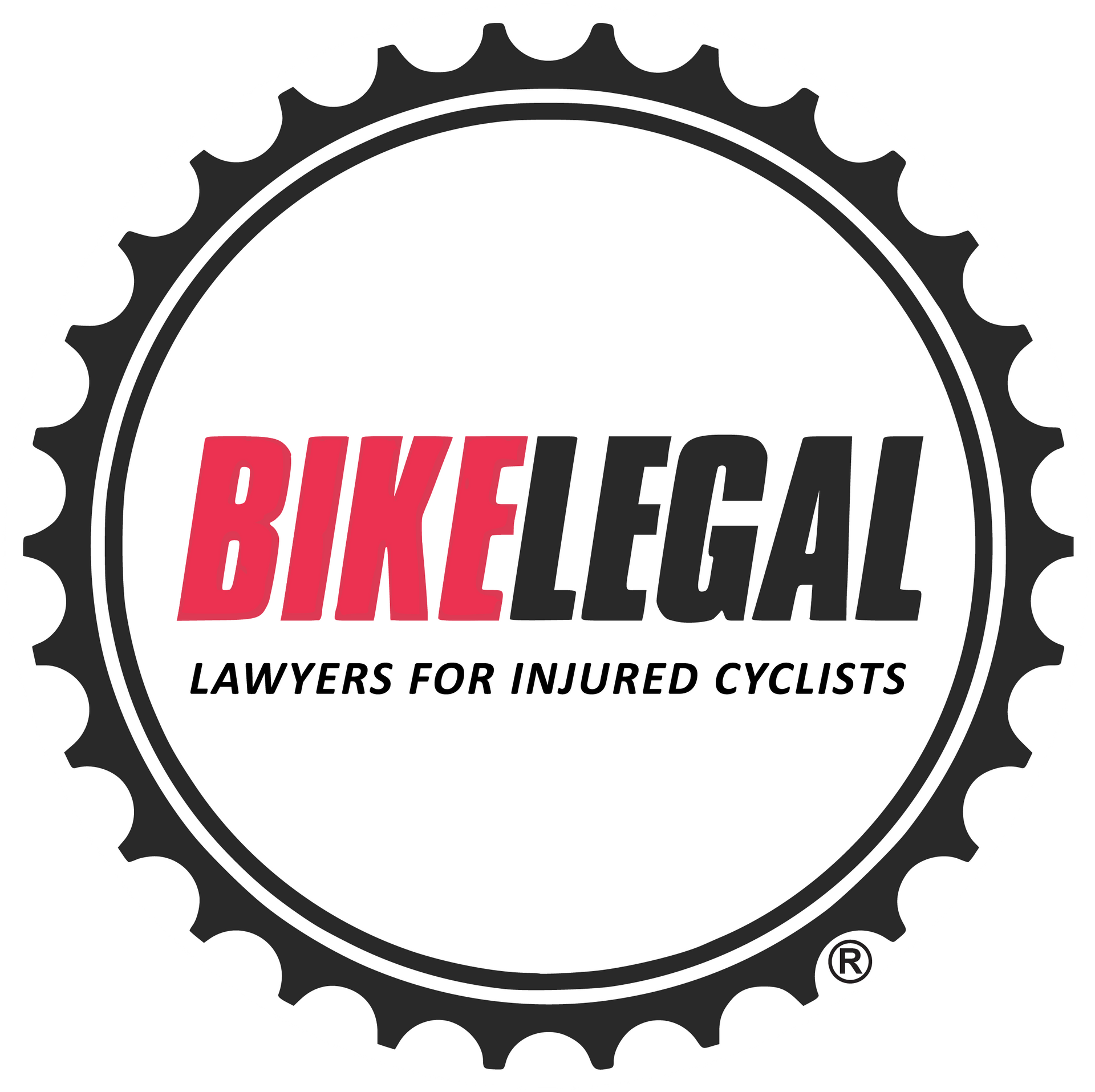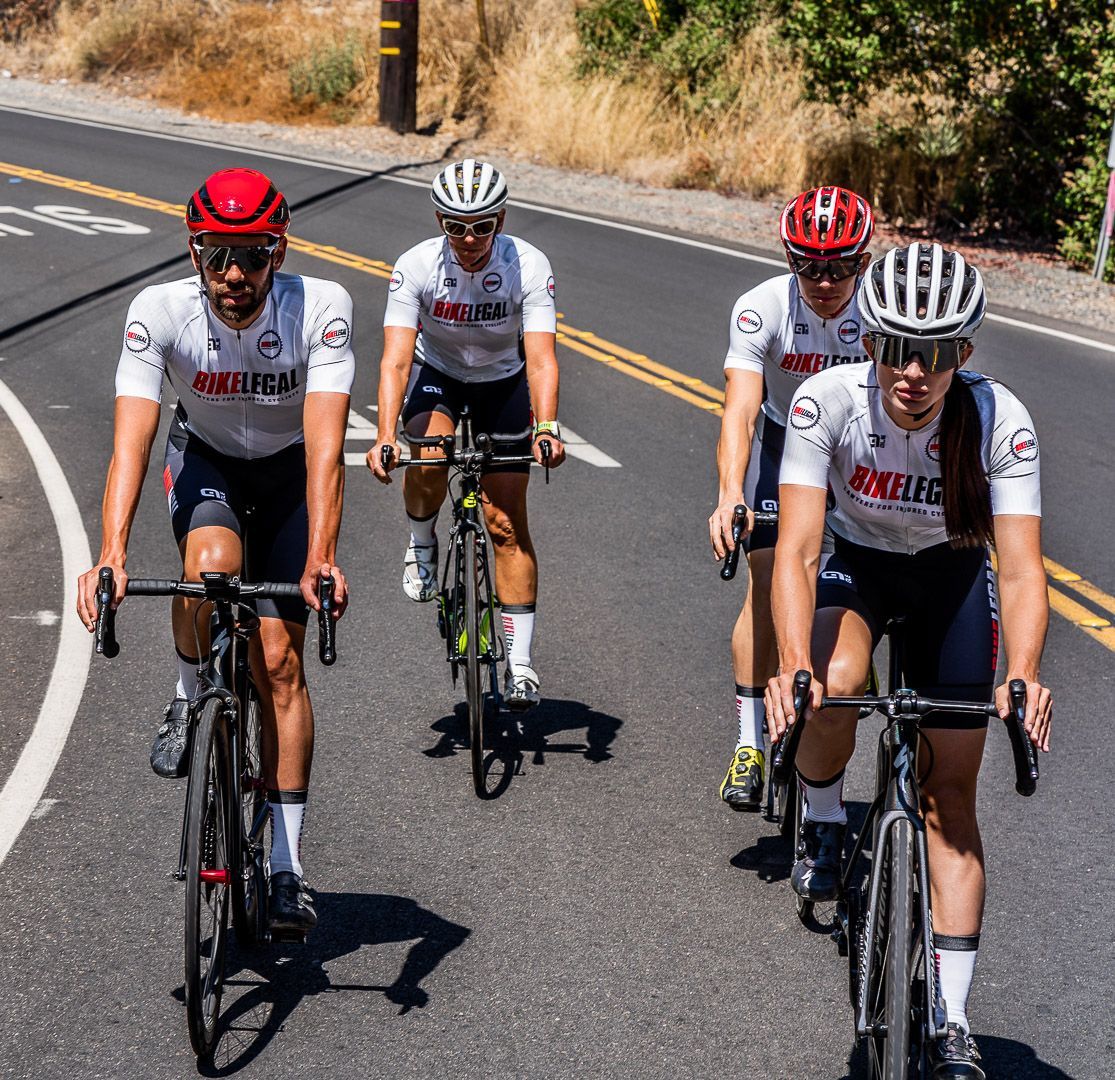AB 1778 Allows Marin County to Enforce Helmet and Age Rules for E-Bike Riders
Follow us on
social media!
California is seeing a rapid rise in e-bike usage, especially among youth. With this growth comes a concerning trend: increasing injuries among riders under 16 on throttle-assisted (Class 2) e-bikes that can reach speeds of 20 mph without pedaling.
In response, California lawmakers passed Assembly Bill 1778 (AB 1778), which introduces new statewide regulations and establishes a local pilot enforcement program in Marin County.
This article breaks down:
- What AB 1778 changes for e-bike riders across California, and specifically in Marin County
- How the new rules will be enforced and what penalties riders might face
What Is AB 1778?
AB 1778 creates both statewide changes to California's e-bike laws and establishes a special pilot program in Marin County. It's important to understand both aspects of this legislation, as they work together but operate differently.
Statewide Changes (Apply to All of California)
The bill updates the California Vehicle Code with two significant changes that apply throughout the entire state:
- Age restriction for Class 2 e-bikes: The existing law prohibits minors under 16 from operating Class 3 e-bikes (which can reach speeds of 28 mph). AB 1778 extends this prohibition to include Class 2 e-bikes as well.
- Helmet requirement for all Class 2 riders: While existing law requires helmets for riders under 18, AB 1778 now requires all riders and passengers on Class 2 e-bikes to wear helmets, regardless of age.
If you're unfamiliar with the different types of e-bikes and their classifications, our guide on Everything You Need to Know About E-bikes (Electric Bicycles) provides a comprehensive breakdown of each class and their specific regulations.
Marin County Pilot Program (2025-2029)
The second part of AB 1778 establishes the "Marin Electric Bicycle Safety Pilot Program," which gives Marin County and its cities special authority to enforce these rules through local ordinances. This pilot program:
- Allows local authorities in Marin County to adopt resolutions prohibiting minors under 16 from operating Class 2 e-bikes
- Permits the authorities to require all persons operating Class 2 e-bikes to wear helmets
- Creates a structured enforcement system with:
- A 60-day warning period (waivable with proof of helmet ownership or a local bicycle safety course).
- A $25 fine for violations after the warning period
- Collect and report detailed enforcement and crash data to the Legislature by January 1, 2028.
- Run a 30-day public education campaign before enforcement.
- Expires on January 1, 2029 (when the law will be repealed)
✅ Clarification: State law is in effect statewide, but only Marin has legal authority for structured, reportable enforcement under AB 1778.
Similar regulatory approaches have been implemented in other California regions, as detailed in our analysis of The E-Bike Epidemic: Bridging the Regulatory Gaps in Orange County, CA. For example, San Diego's e-bike laws now allow the city to restrict young riders under a new state pilot program. However, Marin’s AB 1778 enforcement model remains the most structured of any in California.
Why AB 1778 Was Introduced
The bill was introduced in response to growing concerns about e-bike safety, particularly among young riders. Several factors drove its creation:
Rising Youth E-Bike Injuries
As mentioned in the statistics section, Marin County reported that 35% of e-bike crashes between October 2023 and March 2024 involved riders under 16 years old. Sadly, riders aged 10–15 have 5x the crash rate of adults.
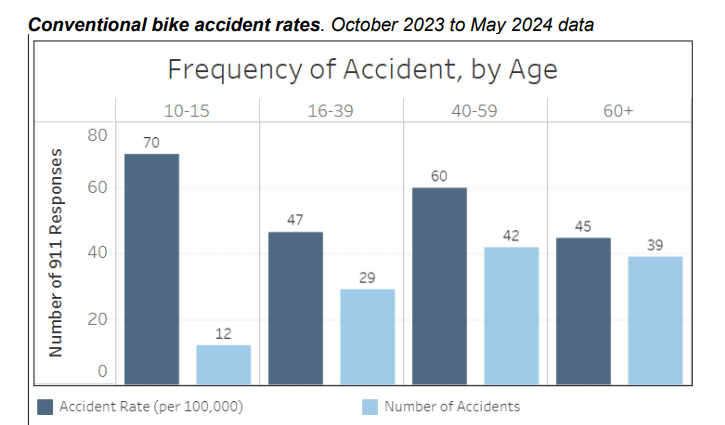
The 2022 Bicycle Injury & Fatality Statistics (2024 Data) show that cyclist deaths continue to rise in the U.S., with e-bikes representing an increasing percentage of these incidents, particularly among younger riders.
Class 2 E-Bike Concerns
Class 2 e-bikes present unique safety challenges because:
- They can reach speeds of 20 mph using throttle power alone (no pedaling required)
- They're easier for inexperienced riders to operate at high speeds
- Many can be modified to exceed their legal speed limits
- They don't require the same physical effort as Class 1 e-bikes, potentially leading to less cautious operation
Marin was granted local authority to act as a test case for more robust enforcement.
Important Distinction: Statewide Law vs. Marin County Pilot
One of the most confusing aspects of AB 1778 is understanding the difference between what applies statewide and what applies only in Marin County. Let's clarify this important distinction:
✅ Statewide Law (Applies to All of California)
Under AB 1778, the following changes to the California Vehicle Code now apply throughout the entire state:
- Age restriction: Persons under 16 years of age are prohibited from operating Class 2 e-bikes (in addition to the existing prohibition on riding a Class 3 electric bicycle)
- Helmet requirement: All riders and passengers on Class 2 e-bikes must wear helmets, regardless of age
These provisions are now part of California law and are technically enforceable anywhere in the state. However, enforcement may vary widely depending on local priorities and resources.
🟨 Marin County Pilot Program (Local Enforcement Model)
The pilot program gives Marin County and its cities unique authority to:
- Adopt local ordinances implementing the statewide rules
- Create a structured enforcement system with:
- Initial 60-day warning period
- $25 fine for violations after the warning period
- Alternative compliance options (waivable with helmet or safety course)
- Collect and report data on:
- Number and demographics of traffic stops
- Whether consent searches occurred
- Crash statistics involving riders under 16
- Nature of crashes (injury severity, etc.)
- Submit a comprehensive report to the Legislature by January 1, 2028
This pilot program is exclusive to Marin County and expires on January 1, 2029.
❓Then Why Isn't It Enforced Everywhere?
Even though the state law prohibiting under-16 riders on Class 2 e-bikes and requiring helmets for all riders is active statewide, enforcement varies for several reasons:
- Not all local governments are prioritizing enforcement.
- Only Marin County has formal guidance on how to implement the rules through ordinances.
- Other cities/counties must rely on general Vehicle Code enforcement, which is inconsistent, especially for youth without an ID.
This means the rules technically apply everywhere, but active enforcement is primarily expected in Marin County as part of the pilot program.
How Marin County Is Implementing AB 1778
Marin County is moving forward with implementing the pilot program through local ordinances. Here's what we know about the implementation process:
County Ordinance Status
The Marin County Board of Supervisors has voted 4-0 to approve a local ordinance implementing AB 1778's provisions. This ordinance:
- Prohibits persons under 16 from operating a class 2 electric bicycle
- Requires all riders of Class 2 e-bikes to wear helmets
- Imposes a $25 citation (base fine) or alternative compliance
- Mandates a public education and outreach campaign
- Conducts comprehensive data collection on citations, demographics, consent searches, and crash outcomes
- Establishes the enforcement framework outlined in AB 1778
- Applies to unincorporated areas in Marin County (cities may adopt similar laws)
This approach balances enforcement with education, focusing on changing behavior rather than simply punishing violations. Our guide, Bicycle Etiquette Guide: Essential Rules and Safety Tips for Cyclists offers additional guidance on safe riding practices that complement these legal requirements.
Enforcement and Legal Concerns
The enforcement of AB 1778 raises several important legal and practical considerations:
Fine Structure and Consequences
While the base fine for violations is $25, the actual financial impact could be much higher:
- Base fine: $25
- Failure to appear or pay: Could result in misdemeanor charges and additional penalties of $300+
Enforcement Challenges
Several practical challenges may arise during enforcement:
- Age verification: How will officers determine if a rider is under 16 without identification?
- Bike classification: Class 2 e-bikes can be difficult to distinguish from Class 1 models
- Selective enforcement: Concerns about potential racial profiling or disproportionate enforcement in certain communities
- Unclear liability: Who is responsible for accidents where youth illegally operate Class 2 bikes?
Arguments in Support of California AB 1778
AB 1778 has garnered support from several organizations and individuals, including:
- California Medical Association (CMA)
- Marin County Board of Supervisors
- E-Bike ACCESS (a local nonprofit)
- Pediatric Health Advocates
They argue that the law is necessary to protect young riders from injuries. Their key arguments include:
- Public health rationale: NIH data shows e-bike riders have 2.4 times greater odds of severe injury than traditional cyclists
- Helmet effectiveness: The National Transportation Safety Board (NTSB) reports that helmets reduce traumatic brain injury risk by up to 60%
- Consistency: The law aligns Class 2 rules with existing Class 3 safety standards
- Education-focused approach: The pilot program emphasizes education over punishment by offering alternatives to fines
- Data collection: The program will gather valuable information to inform future policy decisions statewide
Our guide on the Bicycle Helmet Law Debate provides deeper context on the ongoing discussion about helmet requirements and their effectiveness in preventing injuries.
Arguments in Opposition
Critics of AB 1778, including Streets for All and equity-focused transit groups, have raised several concerns about the law's approach and potential unintended consequences.
Their main objections include:
- Deterrence effect: Helmet mandates may discourage ridership and shift blame to cyclists instead of addressing dangerous driving behavior
- Equity concerns: The law risks over-policing BIPOC riders, especially youth without identification
- Trust erosion: Enforcement-based approaches may damage relationships between communities and law enforcement
- Questionable effectiveness: Enforcement doesn't necessarily guarantee compliance or safety improvements
- Premature action: The law preempts research from the Mineta Institute's statewide e-bike safety study (due January 2026)
Critics also suggest that the law could undermine efforts to reduce car dependence by creating barriers to cycling. Many opponents argue that infrastructure improvements would be more effective than age and helmet restrictions:
- Protected bike lanes can reduce crashes by up to 53% according to Federal Highway Administration (FHWA) data
- Separated cycling infrastructure addresses the root causes of cyclist injuries
- Enforcement-focused approaches may discourage the very behavior (cycling) that should be encouraged for health and environmental reasons.
Schools and Community Reactions
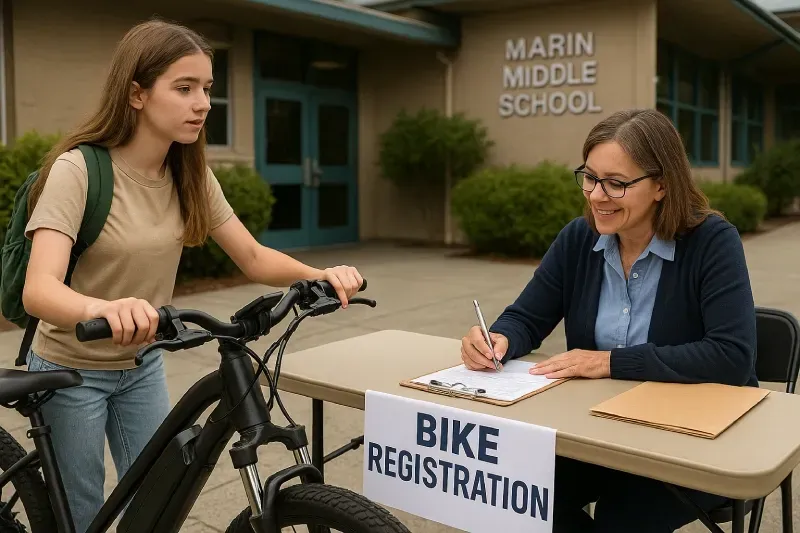
Schools and community organizations in Marin County have already begun implementing AB 1778:
- Many schools have banned Class 2 e-bikes on campuses
- Some, like White Hill Middle School, require mandatory registration of Class 1 e-bikes
- Community members offering off-campus parking have faced legal issues, highlighting the complexity of enforcement
These local responses demonstrate both the community's concern about e-bike safety and the challenges of implementing effective policies that balance safety with accessibility.
Related and Upcoming E-Bike Legislation
AB 1778 is just one of several recent or pending pieces of legislation related to e-bike safety in California:
- AB 1774 (2024): Prohibits the sale, distribution, or possession of devices designed to tamper with e-bike speed limiters
- SB 1271 (2024): Establishes safety standards for e-bike batteries and requires proper labeling
- AB 1946 (2022): Required the California Highway Patrol to develop statewide safety standards and an e-bike safety training program
- AB 2234 (2024): Would prohibit children under 12 from riding Class 1 and Class 2 e-bikes and would require riders to carry identification or proof of completing an e-bike safety course
- SB 381 (2023): Mandated a comprehensive statewide study on e-bike safety, with results due in January 2026 from the Mineta Transportation Institute
This legislative landscape shows that e-bike regulation is rapidly evolving in California, with AB 1778 representing just one approach among many being considered.
Learn more in our article California E-Bike Laws 2025: New Rules, Restrictions, and Safety Requirements.
Broader Policy Context: Safety vs. Access
The debate around AB 1778 reflects a broader tension between safety regulation and transportation access:
E-Bikes as a Climate Solution
E-bikes have enormous potential as a climate-friendly transportation option:
- Nearly 1.2 million electric vehicles (EVs) were sold in the U.S. in 2023, representing a 7.6% market share in 2023, up from 5.9% in 2022 for EVs.
- Over half of all U.S. trips are under 3 miles—ideal for bikes and e-bikes
- Replacing just one car trip per day with a bike ride can reduce an individual's transportation emissions by up to 67%
Safety in Numbers Effect
According to New York City’s Department of Transportation:
- Cyclist fatalities per 100 million trips dropped from 44.2 to 12.8 between 1996 - 2000 and 2011–2015, while cycling trips nearly doubled (a 98% increase), suggesting that as cycling becomes more common, individual safety improves due to increased driver awareness and safer road behavior.
Infrastructure as Primary Solution
Many transportation experts argue that infrastructure improvements are more effective than behavioral regulations:
- Protected bike lanes reduce crashes by up to 53% according to FHWA data
- Separated infrastructure addresses the root causes of cyclist injuries
- Countries with the highest cycling rates and best safety records (Netherlands, Denmark) focus on infrastructure rather than helmet mandates or age restrictions.
These considerations suggest that while AB 1778's safety goals are laudable, a more comprehensive approach that includes infrastructure improvements might better serve both safety and climate objectives.
What Comes Next?
The implementation and evaluation of AB 1778 will unfold over the next several years:
- July 1, 2025: Ordinance goes into effect
- January 1, 2028: Marin County will submit comprehensive data on enforcement and crashes to the Legislature.
Potential Expansion
- Other counties may request similar pilot authority based on Marin's experience.
- The Legislature may consider statewide expansion if the pilot proves successful
- Alternatively, different approaches may emerge from the Mineta Institute study in 2026
The key question remains: Will AB 1778 improve safety outcomes for young riders, or will it create unintended barriers to active transportation without addressing the root causes of e-bike injuries?
Have Questions About California’s E-Bike Laws or a Recent E-Bike Crash?
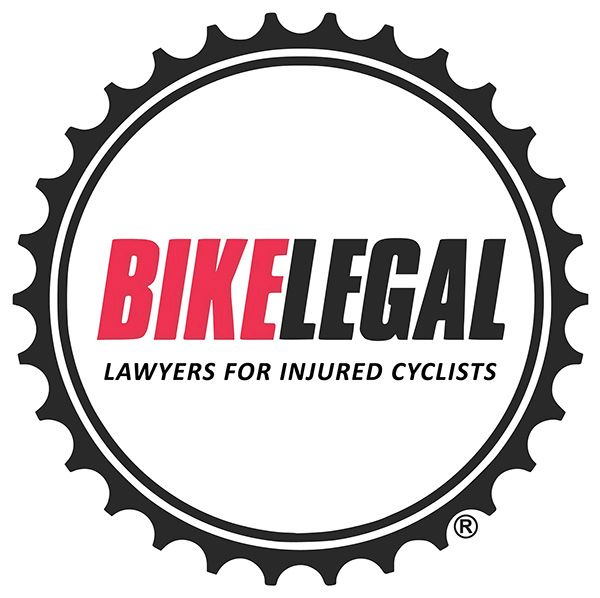
Whether you're a parent with questions about your child's e-bike use or someone injured in an e-bike-related accident, navigating these new laws can be complex. Bike Legal specializes in e-bike cases and can help you understand how AB 1778 and related legislation might affect your specific situation.
Ride Protected. Ride Safe with Bike Legal
At Bike Legal, we don't just practice law, we ride too. Our team understands what it's like to share the road, navigate complex regulations, and advocate for cyclists' rights in an evolving legal landscape.
We know the legal system. We are cyclists just like you. And we'll fight to get you the compensation you deserve.
💬
Contact us today (877-245-3534) for a free consultation.
📞 Speak with an attorney who rides and understands the law.
⚖️ Let us help you protect your rights and pursue fair compensation.
📍 Representing cyclists statewide, including Marin County, Los Angeles, San Diego, and the Bay Area.
Frequently Asked Questions (FAQs)
Does AB 1778 apply to all of California or just Marin County?
Both. The statewide law bans riders under 16 from Class 2 e-bikes and requires helmets for all Class 2 riders. However, only Marin County has been granted special authority to enforce these rules through a structured pilot program with fines, grace periods, and data reporting.
Can I still get a ticket outside of Marin County?
Yes. The new rules are now part of the California Vehicle Code and can be enforced by any peace officer statewide. However, outside of Marin, enforcement may be inconsistent depending on local priorities.
What is a Class 2 e-bike?
A Class 2 electric bicycle is equipped with a throttle that allows the bike to be propelled without pedaling, up to 20 mph. These bikes are legal on many bike paths but now come with stricter age and helmet requirements.
What happens if my child gets a ticket in Marin County under AB 1778?
For the first 60 days after an ordinance is passed, only warning notices will be issued. After that, the fine is $25, but the penalty can be waived if your child completes a safety course and shows proof of helmet ownership or use.
What if my child is stopped, but they don't have ID?
That's one of the criticisms of AB 1778. Officers must estimate age without documentation, which could lead to misidentification and selective enforcement. If your child is cited or detained, you may have grounds to challenge the citation.
What if my child was hit by a car while riding an e-bike?
Call Bike Legal immediately. Whether or not they were following AB 1778 rules, drivers still have a legal duty to avoid injuring cyclists. Bike Legal can help you pursue a claim even in complex situations involving minors or local ordinances.
Is it legal to ride a modified or out-of-class e-bike?
No. Modifying an e-bike to exceed its legal speed class (e.g., going faster than 20 or 28 mph, depending on class) is illegal and may reclassify the vehicle as a moped or motor vehicle, requiring registration and a license.
